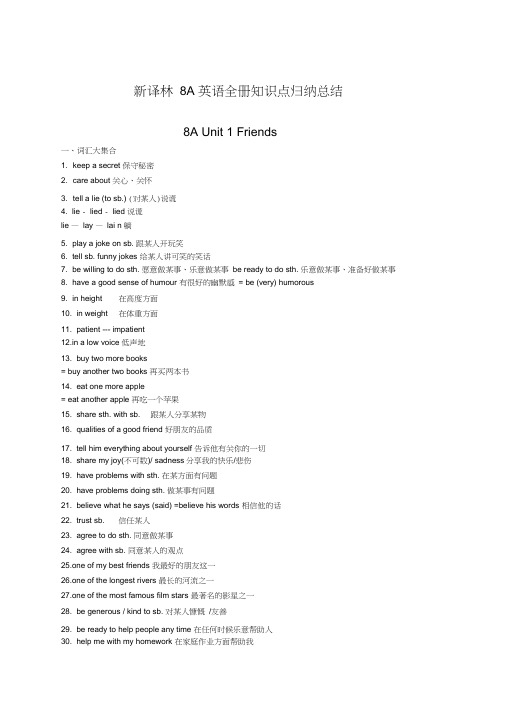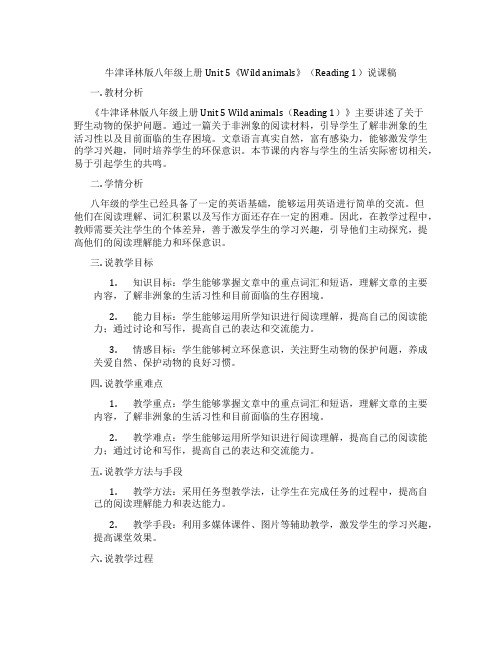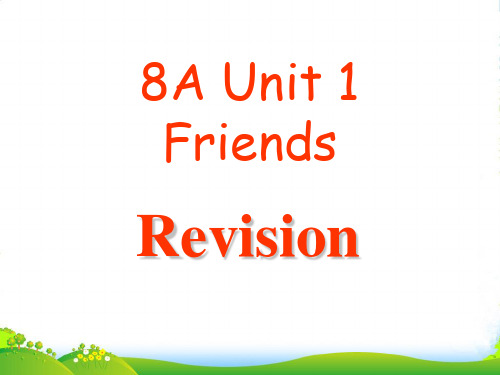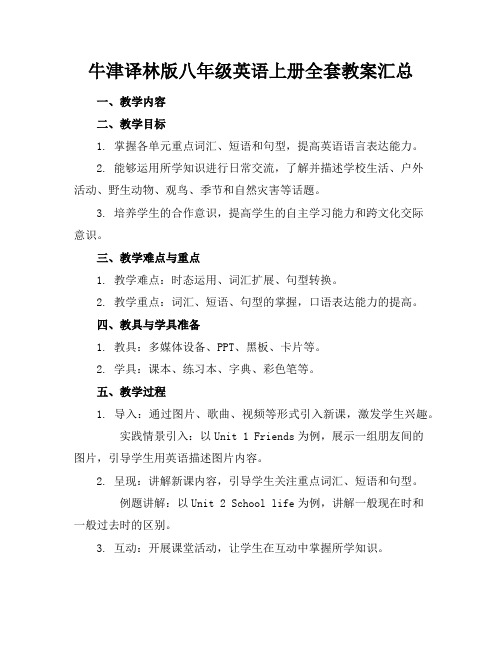牛津译林版英语八年级上册
牛津译林版八年级英语上册全册知识点归纳总结

新译林8A 英语全册知识点归纳总结8A Unit 1 Friends一、词汇大集合1. keep a secret 保守秘密2. care about 关心、关怀3. tell a lie (to sb.) (对某人)说谎4. lie - lied - lied 说谎lie —lay —lai n 躺5. play a joke on sb. 跟某人开玩笑6. tell sb. funny jokes 给某人讲可笑的笑话7. be willing to do sth. 愿意做某事、乐意做某事be ready to do sth. 乐意做某事、准备好做某事8. have a good sense of humour 有很好的幽默感= be (very) humorous9. in height 在高度方面10. in weight 在体重方面11. patient --- impatient12.in a low voice 低声地13. buy two more books= buy another two books 再买两本书14. eat one more apple= eat another apple 再吃一个苹果15. share sth. with sb. 跟某人分享某物16. qualities of a good friend 好朋友的品质17. tell him everything about yourself 告诉他有关你的一切18. share my joy(不可数)/ sadness分享我的快乐/悲伤19. have problems with sth. 在某方面有问题20. have problems doing sth. 做某事有问题21. believe what he says (said) =believe his words 相信他的话22. trust sb. 信任某人23. agree to do sth. 同意做某事24. agree with sb. 同意某人的观点25.one of my best friends 我最好的朋友这一26.one of the longest rivers 最长的河流之一27.one of the most famous film stars 最著名的影星之一28. be generous / kind to sb. 对某人慷慨/友善29. be ready to help people any time 在任何时候乐意帮助人30. help me with my homework 在家庭作业方面帮助我31. give a seat on the bus to someone in need 在公交车上让座给有需要的人32. h ave a good/sweet voice 有个好 / 甜美的嗓音 33. w ear small round glasses 戴小小的圆框眼镜 34. m ake him look smart 使他看起来精干35. never feel bored with him 和他一起从不感到无聊 36. a boring film 一部无聊的电影37. make me thirsty 使我口渴 make sb. / sth.+adj. make me laugh 使我大笑 make sb. do sth. 38. walk past our desks=pass our desks 从我们桌子旁边经过 39. kn ock ...o nto the grou nd 把…撞到地上 knock over 撞翻 ,碰倒knock …off …把…从…上撞下来40. so interesting 如此有趣41. have big bright eyes 有双明亮的大眼睛 42. have/wear long straight hair 留长直头发 43. say a bad word about sb.=say bad things about sb. 说某人的坏话 44. a true friend一个真诚的朋友45. sth. worry sb. 某事困扰某人46. sb. be worried about sth. 某人担心某事47. choose sb. as /(to be) your best friend 选择某人作为你最好的朋友48. look smart in his small round glasses 戴着他的小圆框眼镜看起来帅 49.listen to people carefully 认真听人们倾诉50. help people with their problems 帮人们解决问题 51. make friends with sb. 跟某人交朋友 52. among the six students 在六名学生当中53. among all the Chinese artists 在所有的中国艺术家当中 54. talk about our future plans 谈论我们的未来计划 55. a small girl with a ponytail 一个扎马尾辫的女孩 55. a boy with / wearing glasses 一个戴着眼镜的男孩 56. both .... and ….. 既…又…57. b e/ make / become an excellent teacher 成为一名优秀的教师 58. feel bored or unhappy 感觉无聊或不开心59.like her bright smiling eyes 喜欢她明亮略带微笑的眼睛 60. w ear/have a smile on one 's face 面带微笑 二、句型大集合 1. Can I have something to drink? 2. Can I have some more food? 3. There is nothing in the fridge.冰箱里什么也没有。
牛津译林版八年级上册Unit5《Wildanimals》(Reading1)说课稿

牛津译林版八年级上册Unit 5《Wild animals》(Reading 1)说课稿一. 教材分析《牛津译林版八年级上册Unit 5 Wild animals(Reading 1)》主要讲述了关于野生动物的保护问题。
通过一篇关于非洲象的阅读材料,引导学生了解非洲象的生活习性以及目前面临的生存困境。
文章语言真实自然,富有感染力,能够激发学生的学习兴趣,同时培养学生的环保意识。
本节课的内容与学生的生活实际密切相关,易于引起学生的共鸣。
二. 学情分析八年级的学生已经具备了一定的英语基础,能够运用英语进行简单的交流。
但他们在阅读理解、词汇积累以及写作方面还存在一定的困难。
因此,在教学过程中,教师需要关注学生的个体差异,善于激发学生的学习兴趣,引导他们主动探究,提高他们的阅读理解能力和环保意识。
三. 说教学目标1.知识目标:学生能够掌握文章中的重点词汇和短语,理解文章的主要内容,了解非洲象的生活习性和目前面临的生存困境。
2.能力目标:学生能够运用所学知识进行阅读理解,提高自己的阅读能力;通过讨论和写作,提高自己的表达和交流能力。
3.情感目标:学生能够树立环保意识,关注野生动物的保护问题,养成关爱自然、保护动物的良好习惯。
四. 说教学重难点1.教学重点:学生能够掌握文章中的重点词汇和短语,理解文章的主要内容,了解非洲象的生活习性和目前面临的生存困境。
2.教学难点:学生能够运用所学知识进行阅读理解,提高自己的阅读能力;通过讨论和写作,提高自己的表达和交流能力。
五. 说教学方法与手段1.教学方法:采用任务型教学法,让学生在完成任务的过程中,提高自己的阅读理解能力和表达能力。
2.教学手段:利用多媒体课件、图片等辅助教学,激发学生的学习兴趣,提高课堂效果。
六. 说教学过程1.Pre-reading:教师通过展示一些关于野生动物的图片,引导学生谈论自己喜欢的动物,激发学生的学习兴趣。
2.While-reading:教师引导学生快速阅读文章,回答一些简单的问题,帮助学生理解文章大意。
牛津译林版八年级英语上册Unit1 精品课件(35张)

1. honest (adj. )→ _d_i_sh_o_n__es_t_ (反义词)不诚实的
2. music (n. ) → _m_u_s_i_c_a_l (adj. )有音乐天赋的;音 乐的;爱好音乐的 → _m__u_s_i_ci_a_n_ (n. )音乐家
3. sing(v. ) →s_in__g_er__ (n. ) 歌手
你平时早上七点起床,然后搭公共汽车去学校。
W: What time do you usually get up? M: I often get up at 7 in the morning. W: How do you go to the school? M: I usually go to the school by bus
•Personality: has a good
(8)__s_e_n_s_e__ of humour
•Future plan: /
May •Name: •Appearance:
••P(1e0r)s_oF_nu_at_luiptrylae:ns:
•Looks: has big bright
eyes
straight
He is not as generous as his elder brother.
2.比较级:可用much, a lot ,a little ,a bit, still, even , far等修饰. 其主要句型有: ⑴比较级+than
Mary is much younger than Sue. ⑵the+比较级+of+两者
6. bad(adj. ) → w__o_r_se__ (比较级) 更差的;更糟的; 更坏的→ _w_o_r_s_t (最高级)最差的;最糟的;最坏的
牛津译林八年级上册英语重点单词

牛津译林八年级上册英语重点单词牛津译林八年级上册是一本中学教材,主要面向八年级学生。
在这本书中,学生将学习到许多重要的英语单词。
本文将详细介绍牛津译林八年级上册英语重点单词,并为每个单词提供相关的例句和用法。
1. achieve (v.) - to successfully complete or accomplish somethingExample sentence: He worked hard to achieve his goal of becoming a doctor.Usage: This word is often used when talking about goals, dreams, or success.2. challenge (n.) - a difficult task or problem that requires effort to overcomeExample sentence: Climbing Mount Everest was a great challenge for him.Usage: This word is commonly used to describe a difficult situation or task.3. community (n.) - a group of people who live in the same area and share common interestsExample sentence: She is actively involved in her local community.Usage: This word is often used to talk about a group of people who come together and support each other.4. cooperate (v.) - to work together with others towards a common goalExample sentence: The team members must cooperate to win the game.Usage: This word is commonly used when talking about teamwork or working together.5. develop (v.) - to grow or progress over timeExample sentence: He needs to develop better communication skills.Usage: This word is often used when talking about personal growth or the growth of something over time.6. environment (n.) - the natural world and the surroundings in which people, animals, and plants liveExample sentence: It is important to protect the environment for future generations.Usage: This word is commonly used when talking about nature and the world around us.7. global (adj.) - relating to the whole world; worldwideExample sentence: The company has a global presence with offices in many countries.Usage: This word is often used to describe something that affects or involves the entire world.8. improve (v.) - to make or become better or more satisfactoryExample sentence: She practices every day to improve her piano skills.Usage: This word is commonly used when talking about getting better at something or making something better.9. opportunity (n.) - a chance or possibility to do or achieve somethingExample sentence: Studying abroad is a great opportunity for personal growth.Usage: This word is often used when talking about chances or possibilities.10. pollution (n.) - the presence or introduction of harmful substances or products into the environmentExample sentence: The factory's waste is causing pollution in the river.Usage: This word is commonly used when talking about the harm caused by human activities on the environment.11. responsibility (n.) - the state or fact of having a duty or obligation to deal with somethingExample sentence: It is our responsibility to take care of the elderly in our community.Usage: This word is often used when talking about duties, obligations, or tasks that one must fulfill.12. strive (v.) - to try hard to achieve somethingExample sentence: Many people strive to become successful in their careers.Usage: This word is commonly used to describe the effort or determination put into achieving a goal.13. technology (n.) - the application of scientific knowledge for practical purposes, especially in industry and engineeringExample sentence: The advancement of technology has greatly improved our lives.Usage: This word is often used when talking about the tools, machines, or techniques used in various fields.14. tradition (n.) - a custom or belief that has been passed down within a society or familyExample sentence: Many cultures have unique traditions that have been passed down for generations.Usage: This word is commonly used to describe long-standing customs or beliefs.15. understand (v.) - to have knowledge or awareness of somethingExample sentence: It is important to understand the needs of others in order to provide proper support.Usage: This word is often used when talking about knowledge or awareness of a particular subject or situation.16. value (n.) - the importance or worth of somethingExample sentence: Many people place a high value on friendship.Usage: This word is commonly used to talk about the importance or worth of something.17. visual (adj.) - relating to the sense of sight or the ability to seeExample sentence: The artist has a keen visual sense, which allows her to create beautiful paintings.Usage: This word is often used when talking about the sense of sight or things that can be seen.18. welfare (n.) - the state of being healthy, happy, and prosperousExample sentence: The government provides welfare programs to assist those in need.Usage: This word is commonly used to describe the overall well-being of individuals or groups.19. wilderness (n.) - a large area of land that is undeveloped, untouched by humans, and usually uninhabitedExample sentence: Exploring the wilderness can be a thrilling experience.Usage: This word is often used when talking about natural areas that are untouched by human civilization.20. wilderness (n.) - a situation or place where there is no civilization, or where life is very hardExample sentence: The refugees lived in a state of wilderness until they found shelter.Usage: This word is commonly used to describe situations or places that lack civilization or are extremely challenging to survive in.21. accommodation (n.) - a place to live or stay in, especially while on atrip or for a short period of timeExample sentence: They found suitable accommodation near the university.Usage: This word is often used when talking about places to stay, such as hotels, apartments, or lodgings.22. acknowledge (v.) - to recognize that something exists or is true, often by saying that you understand or accept itExample sentence: She acknowledged the difficulties but was determined to overcome them.Usage: This word is commonly used to show that you recognize or accept a fact or situation.23. adequate (adj.) - enough or suitable for a particular purpose or needExample sentence: The hotel rooms were adequate for our stay.Usage: This word is often used to describe something that is sufficient or meets certain requirements.24. alternative (adj./n.) - another possibility or choice; something that can be chosen instead of something elseExample sentence: They are considering alternative能源 for their home.Usage: This word is commonly used to talk about other options or choices that can be chosen instead of the usual ones.25. analyze (v.) - to examine something carefully and in detail, often in order to find out why or how it worksExample sentence: The scientists analyzed the data to understand the effects of the new drug.Usage: This word is often used when talking about detailed examination or study of a subject.26. anticipate (v.) - to expect or think that something will happen in the near futureExample sentence: We anticipate a rise in sales next month.Usage: This word is commonly used to talk about expecting or predicting future events.27. appreciate (v.) - to recognize the value or quality of something and thank or reward someone for itExample sentence: She appreciated his help and thanked him accordingly.Usage: This word is often used when talking about recognizing and showing gratitude for something or someone.28. arbitrary (adj.) - based on random choice or personal whim, rather than any reason or systemExample sentence: The rules of the game seemed arbitrary and unfair.Usage: This word is commonly used to describe something that is based on random choice or personal preference, without any logical reasoning.29. aspect (n.) - a part of something, or a way of looking at somethingExample sentence: One aspect of the problem is the lack of available resources.Usage: This word is often used to refer to a particular part or aspect of a situation, object, or concept.30. asset (n.) - something that is owned by a person or company and has valueExample sentence: Good reputation can be a valuable asset for a business.Usage: This word is commonly used to describe items, properties, or qualities that have value and can be owned or controlled by individuals or entities.31. attribute (v./n.) - to say that a quality or skill is responsible for something, or to describe a quality or skill that someone hasExample sentence: He attributes his success to hard work and dedication.Usage: This word is often used when talking about qualities or skillsthat are responsible for certain outcomes or possessed by individuals.32. beneficial (adj.) - good for someone or something, often producing a good effectExample sentence: Eating a healthy diet can be beneficial for youroverall health.Usage: This word is commonly used to describe something that is good or advantageous for a person or thing.33. campaign (n.) - a series of actions designed to achieve a particular aim, often political or militaryExample sentence: The government launched a campaign to reduce poverty in the country.Usage: This word is often used when talking about organized actions or efforts aimed at achieving specific goals.34. category (n.) - a group of similar things that are considered as a unitfor a particular purposeExample sentence: The books are organized into different categories in the library.Usage: This word is commonly used to refer to groups or classes ofsimilar items, objects, or concepts that are treated as a unit for specific purposes.35. celebrity (n.) - a famous person, especially someone known for theirability in a particular fieldExample sentence: She is a celebrity in the world of fashion design.Usage: This word is often used to describe individuals who are widely known and recognized for their talents, achievements, or fame.这些是牛津译林八年级上册英语的一些重点单词,每个单词都有其独特的意义和用法。
牛津译林版八年级英语上册全套教案汇总

牛津译林版八年级英语上册全套教案汇总一、教学内容二、教学目标1. 掌握各单元重点词汇、短语和句型,提高英语语言表达能力。
2. 能够运用所学知识进行日常交流,了解并描述学校生活、户外活动、野生动物、观鸟、季节和自然灾害等话题。
3. 培养学生的合作意识,提高学生的自主学习能力和跨文化交际意识。
三、教学难点与重点1. 教学难点:时态运用、词汇扩展、句型转换。
2. 教学重点:词汇、短语、句型的掌握,口语表达能力的提高。
四、教具与学具准备1. 教具:多媒体设备、PPT、黑板、卡片等。
2. 学具:课本、练习本、字典、彩色笔等。
五、教学过程1. 导入:通过图片、歌曲、视频等形式引入新课,激发学生兴趣。
实践情景引入:以Unit 1 Friends为例,展示一组朋友间的图片,引导学生用英语描述图片内容。
2. 呈现:讲解新课内容,引导学生关注重点词汇、短语和句型。
例题讲解:以Unit 2 School life为例,讲解一般现在时和一般过去时的区别。
3. 互动:开展课堂活动,让学生在互动中掌握所学知识。
随堂练习:以Unit 3 A day out为例,让学生分组讨论并描述一次户外活动。
4. 巩固:通过练习、游戏等形式,巩固所学知识。
练习:以Unit 4 Do it yourself为例,让学生用所学的动词短语进行句子填空。
六、板书设计1. 单元2. 重点词汇、短语和句型3. 语法点七、作业设计1. 作业题目:根据Unit 5 Wild animals,写一篇关于保护野生动物的短文。
根据Unit 6 Birdwatching,描述你最喜欢的鸟类。
2. 答案:八、课后反思及拓展延伸1. 反思:对本节课的教学效果进行反思,分析优点和不足,为下一节课做好准备。
2. 拓展延伸:鼓励学生课后观看英语动画片、纪录片,提高英语听说能力。
组织英语角活动,让学生在真实语境中练习英语口语。
引导学生关注国内外时事,提高跨文化交际意识。
重点和难点解析1. 教学内容的详细划分和重点突出。
牛津译林版八年级英语上册Unit1知识点讲解

牛津译林版八年级英语上册Unit1知识点讲解牛津译林版八年级英语上册Unit1知识点讲解重点单词清单1. thirsty /形adj.口渴的典例I'm so thirsty. Can I get something to drink?我如此口渴。
我可以要点儿喝的吗?拓展thirsty的比较级是thirstier, 最高级是thirstiest。
honest/形adj.诚实的;正直的助记诚实的猴[ ho(u) ]待在鸟巢( nest)里。
典例an honest boy一个诚实的男孩反义: dishonest adj.不诚实的,不正直的拓展honest是以元音音素开头的单词,前面用不定冠词an。
联想honesty n.诚实,正直secret /名n.秘密典例I can’t tell you that. It’s a secret.我不能告诉你那件事。
它是个秘密。
短语* keep a secret保守秘密in secret秘密地,暗地里拓展secret adj. 秘密的care/动vi.& vt.关心,关注,在意典例:I don't care much about going to the party.我不太在意去参加那个晚会。
短语>care for 照料;喜欢care about 关心;关怀联想care n. 照管;管理;看护;小心;留神take care of照料,关怀yourself /代pron.你自己助记your( pron.你的)+self(n.自己)= yourself典例Help yourself to some fish, Ann.安,请随便吃些鱼吧。
短语*enjoy yourself玩得开心by yourself独自地,独立地help yourself to... 请随便吃拓展yourself的复数形式为yourselves.6.magazine/n.杂志典例read many kinds of magazines拓展英语中“看”的不同表达(看书read a book看电影see/ watch a film看电视watch TV看黑板look at the blackboard看医生see the doctor看窗外look out of the window7. good-looking /形adj.好看的,漂亮的助记> good( adj.好的) +looking( adj.●.....相貌的)= good-looking典例>Lucy is a good-looking girl.露西是-个漂亮的姑娘。
新译林版牛津英语八年级上册英语单词
新译林版牛津英语八年级上册英语单词一、Introduction1.1 Overview1.2 Importance of learning English vocabulary 1.2.1 Communication1.2.2 Academic and professional success1.2.3 Cultural understanding二、The structure of English vocabulary2.1 Word families2.2 Parts of speech2.3 Synonyms and antonyms2.4 Collocations2.5 Idioms and phrasal verbs三、Learning and memorizing English vocabulary3.1 Contextual learning3.2 Mnemonics3.3 Flashcards and spaced repetition3.4 Regular practice and review四、New Oxford English 8A vocabulary list4.1 Nouns4.1.1 Common nouns4.1.2 Proper nouns4.1.3 Countable and uncountable nouns4.2 Verbs4.2.1 Regular verbs4.2.2 Irregular verbs4.2.3 Modal verbs4.3 Adjectives4.3.1 Adjectives to describe personality4.3.2 Adjectives to describe appearance4.4 Adverbs4.4.1 Adverbs of manner4.4.2 Adverbs of frequency4.5 Phrases and expressions五、Tips for effective vocabulary acquisition5.1 Reading extensively5.2 Keeping a vocabulary journal5.3 Using English in d本人ly life5.4 Engaging in meaningful conversations六、Conclusion6.1 Recap of the importance of English vocabulary6.2 Encouragement for continuous learning6.3 Suggestions for further resources and practice以上是新译林版牛津英语八年级上册英语单词的内容,学习英语单词要多多练习,才能更好地掌握英语单词。
牛津译林版八年级上英语知识点总结
牛津译林版八年级上英语知识点总结8A unit1Friends1、something to eat/drink吃的东西/喝的东西2、some more food再来一些食物two more days = another two days3、maybe可能,也许(句首)may be也许是(句中)4、share sth with sb = share sb sth与某人分享某物5、honest诚实的dishonest不诚实的6、keep a secret保守秘密7、make sb + adj(happy/sad)make sb/sth do sth8、joy = happiness不可数名词9、care about关心10、help oneself to随便吃11、polite礼貌的impolite不礼貌的12、tidy整齐的untidy不整齐的13、tell lies/tell a lie说谎14、play a joke on sb取笑某人15、come true完成18、help sb with/do/to do sth帮助某人做某事19、voice嗓音noise喧华声,喧嚣声sound声音20、a sense of humour幽默感21、knock into sb撞在某人身上22、choose to do sth选择做某事23、height高度adj为high高的put on weight增肥lose weight减肥25、among强调在三者或三者以上之间26、plan to do sth计划做某事27、what’s sb like?用于讯问或人的性情、品质等what does sb like?用于询问某人的喜好what does sb look like?用于询问某人的外貌28、with带有,具有29、fat----- fatter------fattest30、patient耐心的impatient不耐心的31、in need需要32、be kind to sb对某人友好33、any time在任何时候34、knock..onto把...撞....35、say a bad word about sb.说某人的坏话36、talk about谈论37、social worker社会工作者38、grow up长大,成长39、next to挨着40、What about +n./v. -ing? (做) ...怎.么样?41、be good at+n./v.-ing擅长(做)某事42、would like to do sth.想做某事18A unit2 School life1、have to不能不、必需三单方式:has to曩昔时态:had to未来时态:will have to2、hard努力地比力级harderIt’s raining hard. Hard意为大量地、辛苦地3、a little大批,一点儿透露表现一定意义little很少,几乎没有表示否定意义a few有几个,有一些透露表现一定意义few没有几个,几乎没有表示否定意义4、go on vacation去度假5、提发起的经常使用句型:①Could/Would you please do sth.?请你做某事好吗?②Shall we/I do sth.?我们/我做某事好吗?③Let's do sth.咱们做某事吧。
牛津译林版八年级英语上册Unit1 全单元课件
12.告诉她有关你自己的一切 tell her everything about yourself
13. 愿意帮助
be ready to help
14.有困难
have problems
15.相信他的话
believe what he says
16.青少年杂志
Teenagers magazine
17.什么人适合做朋友?
6. have problems (with sth. )(在…方面)有问题
He __h_a_s_s_o_m_e__p_ro_b_l_e_m_s__w_i_th____his English. (在英语学习上有些问题)
7. believe what he/she says
相信他/她说的话
=__h_i_s/_h_e_r _w_o_r_d_s___
2. My friend is honeset so bI.bDeolieyovue talk to him/her when
what he / she says.
you are happy?
3. My friend keeps acsecrec.t CsoanIytoeullthelilmhim/ h/ ehrer everything about myself. everything about yourself ?
_b_u_y__so_m__e_m__o_r_e (再买一些). 4. My best friend often _m_a_k_e_s__m_e_h_a_p_p_y_ (让我开心). 5. He always helps me when I _h_a_v_e_p_r_o_b_le_m__s (有困难).
● be honest
牛津译林版八年级上册英语知识点归纳(完整版)
牛津译林版八年级上册英语知识点归纳(完整版)Unit1:Friends1 three passages about friends 关于朋友的3篇文章2 to use the new words to describe my friends 用生词描述我的朋友3 to use comparative and superlative adjectives 使用形容词的比较级和最高级4 to use a vocabulary tree to remember new words 用词汇树来认生词重点知识回顾一【重点单词】thirsty 口渴的honest 诚实的;正直的secret 秘密care 关心,在意yourself 你自己magazine 杂志good-looking 好看的humorous 幽默的polite 礼貌的tidy 爱整洁的,整洁的make 成为;适合trust 信任lie 谎言joke 玩笑true 确实的,的确any time 在任何时候voice 嗓音singer 歌手almost 几乎,差不多round 圆形的sense 感觉,观念bored 无聊的fit 可容纳,装进knock 碰,撞straight 笔直的sweet 可爱的,惹人喜爱的smile 微笑choose 选择,挑选worse (bad的比较级)更差,更坏,更糟糕worst(bad的最高级)最差,最糟,最坏height 高,高度weight 重量competition 竞赛,比赛test 测试,考查swimmer 游泳者plan 打算,计划social 社会的shy 害羞的smiling 微笑的handsome 英俊的patient 耐心的unhappy 不快乐的;悲伤的excellent杰出,极好的二【重点短语】1 something to drink 一些喝的东西2 have some more food 再吃点儿食物3 one of my best friends 我最好的朋友之一4 be willing to share things with her friends 愿意和她的朋友分享东西5 help me with my homework 帮助我做家庭作业6 give her seat on the bus to someone in need 在公共汽车上把她的座位让给有需要的人7 grow up 长大,成长8 make sb. look smart 是某人看上去聪明9 have a good sense of humour 有很强的幽默感10 tell funny jokes 讲有趣的笑话11 walk past our desks 经过我们的课桌12 knock…onto…把……撞到……上13 say a bad word about sb. 讲某人的坏话14 keep a secret 保守秘密15 travel around the world 环游世界16 both my neighbour and my best friend17 feel bored or unhappy 感到无聊或不快乐三【重点句型】1 There’s nothing in the fridge. 冰箱里没有东西2 He tells funny jokes and always makes me laugh. 他讲滑稽的笑话而且总是使我大笑。
- 1、下载文档前请自行甄别文档内容的完整性,平台不提供额外的编辑、内容补充、找答案等附加服务。
- 2、"仅部分预览"的文档,不可在线预览部分如存在完整性等问题,可反馈申请退款(可完整预览的文档不适用该条件!)。
- 3、如文档侵犯您的权益,请联系客服反馈,我们会尽快为您处理(人工客服工作时间:9:00-18:30)。
期末复习(三)8A Unit7一、单项选择( ) 1. ---____perfect time it is to enjoy the sunshine on the beach___ every Sunday afternoon!---Yes. Especially(尤其)children do.A What a; on B. What a; / C. What the; / D. How; on( ) 2.It may be dangerous ________ a car _________a snowy day.A. to drive, inB. to drive, onC. drive, inD. drive, on( ) 3. ---_________ will the temperature be tomorrow?---I don’t know. The temperature is so ___________ that(以至于)I catch a cold.A.What; low B. What; tall C. How; high D. How; hot( ) 4. Don’t forget ________ an umbrella. It’s going to rain.A. to bringB. to takeC. takingD. bringing( ) 5. The sentence structure of ‘My mum cooked me a nice meal yesterday’is:A. S+V+PB. S+V+OC. S+V+DO+OCD.S+V+IO+DO ( ) 6. ——_____________ does she weigh? ——Her ______________ is 50kg.A. How heavy; weighB. How many; weightC. How much; weightD. How much; weigh ( )7. The TV show Letters Alive brings back people's of writing to each other.A. ideasB. hobbiesC. stylesD. memories( ) 8. The boy didn’t find his pen, so he had to write his letter ________ his pencil.A. usedB. useC. to useD. using( ) 9. The_______ information made all of us _______.A. excited;feel excitingB. exciting;feel excitedC. excited; to feel excitingD. exciting;to feel excited( ) 10. Today the forests are getting fewer and fewer. We must ______ down too many trees.A. keep people from cuttingB. prevent people from cuttingC. stop people cuttingD. all the above( ) 11. life , ______weather, _______ be sunny and beautiful all the time.A. like ; mustn’tB. like; can’tC. likes; can’tD. like ; mustn’t ( ) 12. We will do everything we can ________ the birds living there.A. saveB. to saveC. savingD. to saving ( ) 13. Which sentence structure is “S+V+P”?A. Farmers harvest crops.B. Autumn leaves turn brown.C. We have four seasons.D. We call the boy Tommy.( ) 14. ________ the earthquake happened, most of the people ________ at home.A. While; were sleepingB. When; sleptC. While; sleptD. When; were sleeping ( ) 15. I hear that there ____ a basketball match this afternoon.A. will haveB. will hasC. is going to haveD. will be ( ) 16. You look good ______red and blue looks nice _______you, too.A. on, onB. in, inC. on, inD. in, on ( ) 17. We have got everything ready, so we need___________.A. else somethingB. something elseC. nothing elseD. else nothing ( ) 18. That restaurant is ________ people, and they look very ________.A. full with, happyB. fill with, happilyC. full of, happyD. fill to, happily ( ) 19. John often tells us funny jokes.________ he is !A.what a funny boyB. What funny boyC. How funny boyD. How a funny boy ( ) 20. —May I speak to Daniel, please?—_______.A. Not at a11B. SpeakingC. Thank youD. She is fine二、完形填空The weather is closely related(联系) to our life. It is all around us all the time. It is an __1__part of our lives. We cannot control it, but it often controls how and 2 we live, what we do, what we wear and what we eat. Read this passage and learn 3 about the weather.What is the weather.The weather is just the state of the atmosphere 4 any time, such as temperature, wind, __5 _ ,sun,etc.What ___6___ the weather change.As we know, not every place on the earth gets the same amount of sunlight. Some places get__7___ sunlight, so it’s warmer in those places. However, some places get little__ 8___no sunlight in winter. Then those places have __9___ temperatures. These differences in temperature mak e the air and water__10 __around the earth. The movement helps to take the heat energy from the sun across the earth. So the 11 changes.What’s the ___12____between weather and climate(气候)Climate is a place’s weather __13__ a long time. The weather changes from day to day and 14 from hour to hour. It can be sunny in the morning and cold and wet in the afternoon. But the climate changes very 15 ove r lots of years.( )1. A. important B. interesting C. exciting D. useful( )2. A. where B. which C. what D. when( )3.A. anything B. nothing C. something D. everything( )4.A. in B. for C. on D. at( )5.A. water B. rain C. plant D. animal( )6. A. asks B. makes C. helps D. gets( )7.A. much B. more C. little D. less( )8.A. and B. so C. or D. but( )9. A. colder B. hotter C. lower D. higher( )10.A. move B. moves C. moved D. moving( )11.A. sun B. earth C. weather D. sunlight( )12.A. same B. different C. difference D. like( )13.A. for B. past C. at D. over( )14.A. already B. almost C. ever D. even( )15.A. differently B. slowly C. carefully D. easily四、阅读理解Long long ago, there was a kind lady. Every day, she baked bread for her family and an extra loaf for any hungry passer-by. She placed the extra bread beside a window. When the woman placed the bread, she always gave a prayer for her son. Her son had gone to a faraway place and she hadn’t heard from him for a very long time.Every day, a tramp(流浪汉)came and took away the bread. He said when he was leaving, “The evil you do remains with you. The good you do comes back to you.”The woman felt irritated. “Not even a word of thanks”, she said to herself with unhappiness.This went on, day by day.Finally, the woman became so angry that she decided to get rid of the tramp. She added poison(毒) to the bread she was going to offer to the t ramp! When she was placing it, her hands shook. “Look at what I’ve done!” she immediately threw the bread into fire and made another one.As usual, the tramp came and pick up the bread. “The evil you do remains with you. The good。
